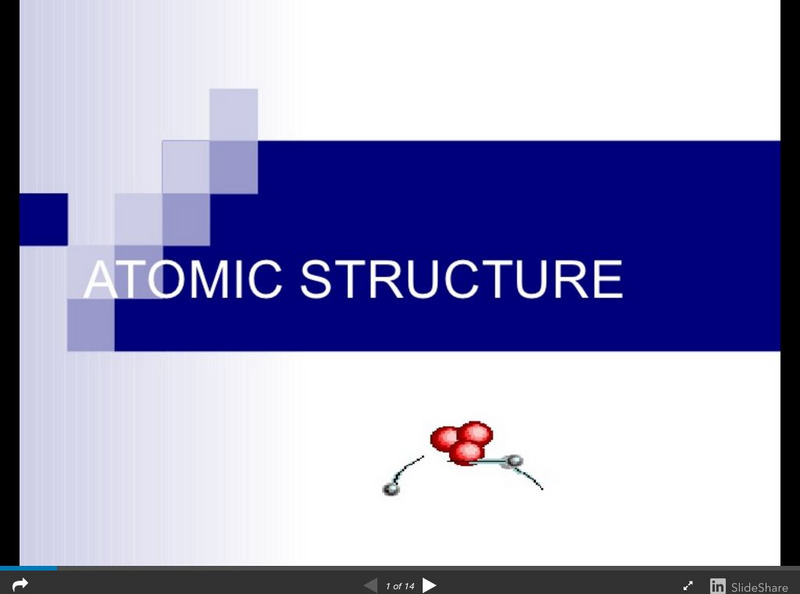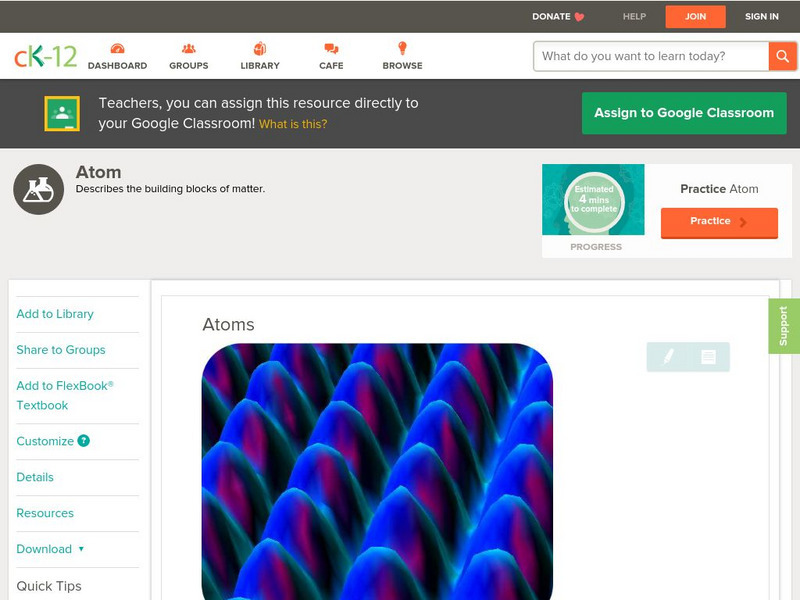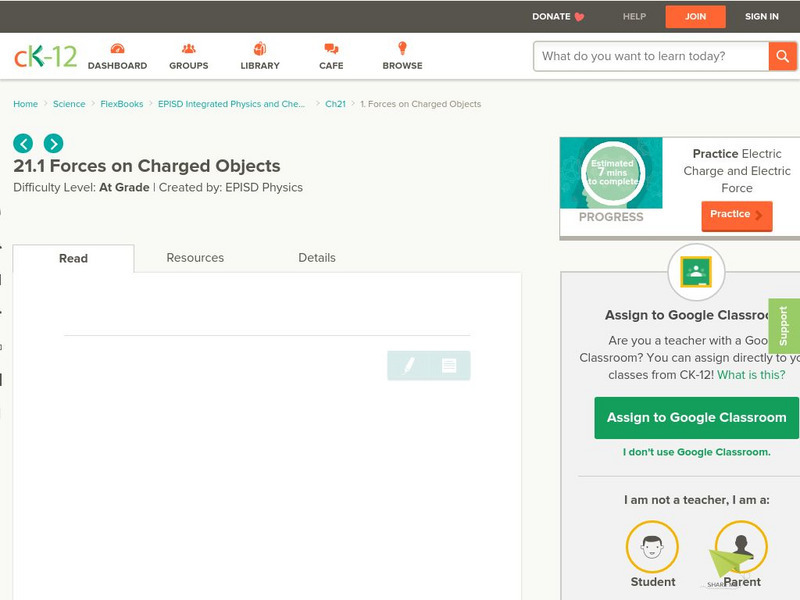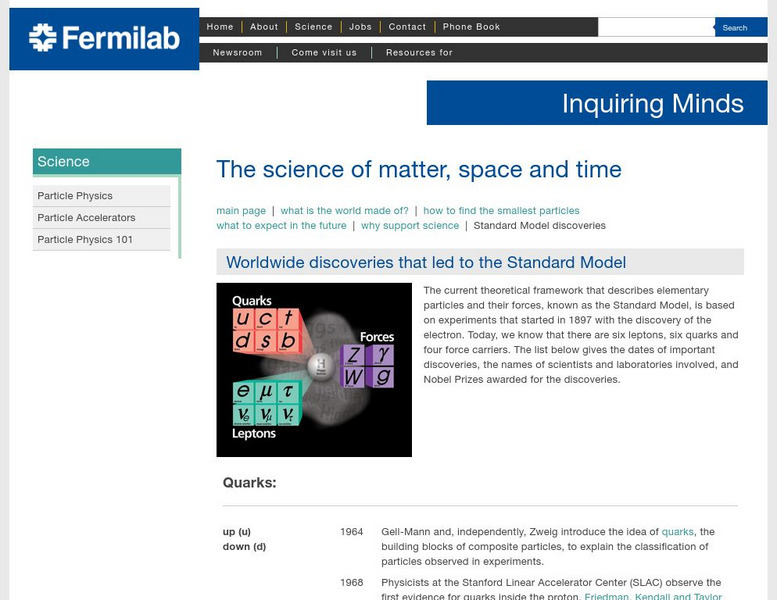Hi, what do you want to do?
TED Talks
Ted: Ted Ed: The Strengths and Weaknesses of Acids and Bases
In the chemical economy, acids actively give away their protons while bases actively collect them, but some more aggressively than others. George Zaidan and Charles Morton use the currency of subatomic particles to explain this unseen...
Tom Richey
Slide Share: Atomic Structure
Slideshow looking at the history of models of the atom, including those proposed by John Dalton, J.J. Thomson, Ernest Rutherford, Niels Bohr, and James Chadwick. Discusses subatomic particles, including the numbers of protons, neutrons,...
OpenStax
Open Stax: Structural Organization of the Human Body
Try considering the structures of the body in terms of fundamental levels of organization that increase in complexity: subatomic particles, atoms, molecules, organelles, cells, tissues, organs, organ systems, organisms and biosphere....
CK-12 Foundation
Ck 12: Physical Science: Atoms
[Free Registration/Login may be required to access all resource tools.] Atoms and how they are related to elements, and the particles that make up atoms.
Other
University of Kansas: Quarked!: Subatomic Match
Match the Quarkster characters by identifying which of six different traits and three colors they have in common.
National High Magnetic Field Laboratory
Magnet Academy: Murray Gell Mann
Murray Gell-Mann is a theoretical physicist who won the Nobel Prize for Physics in 1969 for his contributions to elementary particle physics. He is particularly well known for his role in bringing organization into the world of subatomic...
Physics4kids
Physics4 Kids: Modern Physics: Looking Into Atoms
Get an inside look the subatomic particles of atoms.
Other
University of Kansas: Quarked!: Rummy
A card game where you must combine different types of quarks in order to make baryon particles, or to make particle decay chains.
Other
University of Kansas: Quarked!: Word Search
A word search with vocabulary related to the study of subatomic science.
Other
University of Kansas: Quarked!: Baryon Blaster
Try to fill each SUV with the right kinds of quarks as it travels across the screen, in order to make different types of baryon particles. The game becomes more challenging as you progress through the levels.
University of Cambridge
University of Cambridge: Physics: The Neutron
This site provides a great series on the neutron discovered by James Chadwick. Includes a seven-page series that covers what is inside the nucleus, the elusive neutron, beryllium radiation, Chadwick's discovery, neutrons from beryllium,...
Symmetry Magazine
Symmetry Magazine: Explain It in 60 Seconds: The Intensity Frontier
This article briefly describes the Intensity Frontier, one of several research approaches to the area of particle physics.
CK-12 Foundation
Ck 12: Physical Science: Atoms
[Free Registration/Login may be required to access all resource tools.] Atoms and how they are related to elements, and the particles that make up atoms.
CK-12 Foundation
Ck 12: Forces on Charged Objects
[Free Registration/Login may be required to access all resource tools.] Students learn which subatomic particles contribute to static electricity, and determine the charge of an object based on what particles it has gained or lost.
Utah Education Network
Uen: Atomic Model Construction
Students create models of atoms then compare the various aspects of the atoms including; relative size, charge, positions of subatomic particles, and identity of the atom based on proton, neutron, and electrons with the class.
Other
Fermilab: Worldwide Discoveries That Led to the Standard Model
A thorough review of subatomic particles and the people that discovered them. Each particle has its own link for additional information.
Vision Learning
Visionlearning: Atomic Theory and Structure: The Early Days
Explanation of the evolution of atomic theory and the experimentation associated with these concepts.
BBC
Bbc: Gcse Bitesize Science: Atomic Structure
An explanation of atomic structure and the element groups in the periodic table using plain language. Supported by diagrams and charts.
National High Magnetic Field Laboratory
Magnet Academy: Timeline of Electricity and Magnetism: 1960 1979
Computers evolve into PCs, researchers discover one new subatomic particle after another and the space age gives our psyches and science a new context.
CK-12 Foundation
Ck 12: Plix: Create an Atom: Electrons
[Free Registration/Login Required] Explore electrons by dragging the subatomic particles to the correct location to create a beryllium atom.
BiologyWise
Biology Wise: Levels of Biological Organization
Describes the levels of organization in biology, from the subatomic particle up to the biosphere.
Symmetry Magazine
Symmetry Magazine: Explain It in 60 Seconds: The Terascale
The terascale, described in this article, is a subatomic region that requires enormous amounts of energy in order to reach it. Scientists hope to be able to study it with the Large Hadron Collider. "Explain It In 60 Seconds" is an...
American Chemical Society
Middle School Chemistry: Protons, Neutrons, and Electrons
Explore the particles that make up atoms: protons, electrons, and electrons.
Royal Society of Chemistry
Royal Society of Chemistry: Gridlocks: Level 3
A collection of grid puzzles that cover a wide variety of topics in advanced high school chemistry. These are excellent for topic review and reinforcement. The puzzles can be played online and also downloaded as worksheets. Answers are...






















